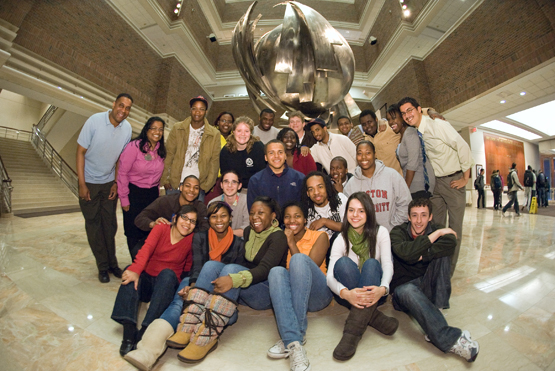How (and Why) to Become a Mentor
Thursday event showcases opportunities for faculty and staff

For the past three years, Jackie Boyle has volunteered to chaperone one of BU’s annual Alternative Spring Break trips. On a trip to Arkansas, the acting director of student services in the School of Education offered some friendly advice to a student who later went to law school outside Massachusetts. But distance didn’t end the relationship; Boyle continues to offer advice and emotional support. She has become, phone call by phone call, a mentor.
“I became a part of her life,” says Boyle. “By mentoring, you create a network of people who you support and what’s more, they’ll support you.”
Tomorrow, faculty and staff will have an opportunity to learn more about mentoring, when Laurie Pohl, vice president for enrollment and student affairs, Kenneth Elmore, dean of students, and David Zamojski, director of Residence Life and an assistant dean of students, hold an informational workshop about organized mentoring opportunities on campus. The speakers will talk about the Posse Foundation, the Faculty-in-Residence Program, the Boston Public School Community Service Program, and a program that offers faculty and staff members the opportunity to share a meal with students in an on-campus dining hall. Other engagements include Siblings, a program that matches BU community members with local elementary school students, and Winter Outreach, a new service trip for students over winter intersession.
“We want to develop a pipeline of people who are interested in serving as a mentor,” Pohl says. “Some of the opportunities are new, others have been around for a while, but all of them need new people each year.”
The Student Activities Office alone, says Pohl, has 533 student groups, and many of them need a faculty or staff mentor. She says the time commitment can vary from an hour a semester to an hour or more a week.
Boyle also is involved with the Boston Public School Community Service Program, where she helps BU students who graduated from Boston high schools complete community service programs. Program mentors, according to Boyle, are like a GPS for students. “Mentoring benefits the student and the person doing the mentoring,” she says. “Everyone wins.”
Jeffrey Allen, an assistant professor of information systems in the School of Management, is a mentor to Posse Foundation students. The organization works in major cities around the country identifying public high school students with high potential who may be overlooked by the traditional college selection process. Participating universities, such as BU, provide these students with full-tuition scholarships. To date, Posse students have been given more than $265 million in scholarships, and they have a 90 percent college graduation rate — much higher than the national average.
Allen’s efforts are on the high end of the mentoring commitment spectrum: he meets with each of his 12 students individually every other week for an hour, and the group meets for an additional two hours a week. Allen says he felt a connection with this year’s group because they are from Athens, Ga., where he lived for 20 years. Also, he says, as an “underrepresented faculty member, I wanted to help bring underrepresented groups to campus.
“Undergraduate success and retention are increased when there is faculty involvement outside the classroom,” he says. “As an advisor, you’ll ask questions about what they’re doing and meet with them a few times a semester. It’s good to get involved instead of using your name as a rubber stamp.
“If you teach undergrads, it’s about getting involved with them in the classroom and the outside,” he continues. “If we’re faculty members, someone helped us; part of the process for me is that I enjoy being involved with undergraduate students. I learn a lot, and I know I can give them life perspective.”
The mentoring event, for faculty and staff only, takes place tomorrow, Thursday, November 5, from 3:30 to 5 p.m. at the Howard Thurman Center, George Sherman Union lower level, 775 Commonwealth Ave. For more information, contact Brooke Faulkner at 617-358-4555. Students who are interested in volunteering should check out the Community Service Center.
Amy Laskowski can be reached at amlaskow@bu.edu.

Comments & Discussion
Boston University moderates comments to facilitate an informed, substantive, civil conversation. Abusive, profane, self-promotional, misleading, incoherent or off-topic comments will be rejected. Moderators are staffed during regular business hours (EST) and can only accept comments written in English. Statistics or facts must include a citation or a link to the citation.